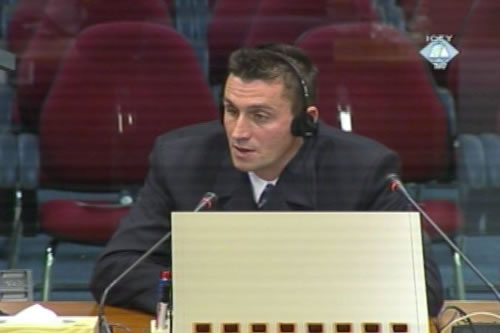Home
MUJAHEDIN AS “RELIEF WORKERS”
The mujahedin instilled fear in some Bosniaks, partly because of the crime in Miletici. But others supported them and were provided with food, religious education, and “fitness training,” a defense witness at the trial of the former BH Army commanders testifies.
 Hamid Suljic, defense witness for Hadzihasanovic
Hamid Suljic, defense witness for Hadzihasanovic The prosecutor places responsibility for the crime in the village of Miletici on the BH Army, while the defense of the former BH Army commanders in central Bosnia argues that responsibility rests squarely on the mujahedin and that Bosniaks were victims, too.
Prosecutors tried to prove at the trial of Enver Hadzihasanovic and Amir Kubura that after the mujahedin raided the hamlet north of Travnik on 24 April 1993, four Croats were killed; the remaining civilians were detained and taken to the nearby mujahedin camp.
Defense witness Hamid Suljic, a BH Army soldier at the time, was on a military mission that day. As he returned to headquarters, he encountered a column of prisoners. Among them he recognized his father and two uncles. “I saw that my father was covered in blood and I reacted,” Suljic said. The mujahedin, who had automatic weapons and were masked, prevented him from coming near his father. “The driver of our car then got hold of me and said, “Suljic, don’t, we’ll get killed!”
The witness testified that the BH Army engaged in negotiations with the mujahedin that evening over the release of prisoners and managed to get them freed. He knows that representatives of the BH Army and the HVO had conducted an on-site investigation into the murders in the village, but he does not know what was done afterwards to punish the perpetrators of the crime.
Defense witnesses – former BH Army soldiers – say the BH Army was unable to punish the mujahedin, that it did not have any command authority over them. The prosecution, however, suggests that the BH Army, which was superior in number, could have disciplined a group of foreigners and that its failure to do so indicates it had links with the mujahedin.
Several witnesses stated that it was risky to intervene against the mujahedin because they were helping some of the local residents and had their support. The foreigners came to central Bosnia as “relief workers” and the aid was welcome, defense witnesses claim. They did not explain how the relief workers got transformed into well-equipped soldiers.
“There was a serious crisis in the Biljanska valley, people did not have anything to eat or wear. That is why those foreigners were able to woo the lads with their money and relief supplies,” Suljic concluded. The mujahedin also gave religious classes and “fitness training” to those Bosniaks who wanted it. In Suljic’s opinion, it was not “military training,” but merely physical exercise which consisted of “running through the village.” At the end of the exercises, they would receive uniforms as a reward.
Linked Reports
- Case : Hadzihasanovic & Kubura - "Central Bosnia"
- 2004-11-16 SPECIAL MEASURES FOR MONASTERY
- 2004-11-10 IN DETENTION OR “UNDER PROTECTION”?
- 2004-11-08 WAS THERE A LINK BETWEEN THE BH ARMY AND THE MUJAHEDIN?
- 2004-11-22 AVOIDING CONFLICT “AT ALL COSTS”
- 2004-11-30 THE ARMY DID TRY TO RESIST THE MUJAHEDIN
- 2004-12-01 WHAT DOES GUNSHOT RESIDUE PROVE
